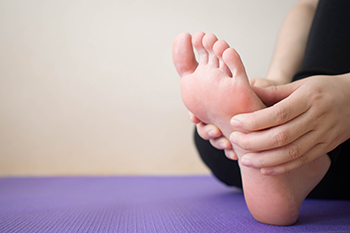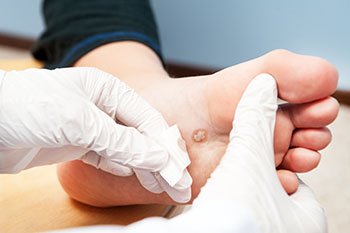Connect With Us
Blog

The feet can reflect underlying liver conditions through several noticeable changes. Yellowing of the skin and nails, known as jaundice, is a common sign of liver dysfunction and may first appear subtly in the toes or soles. Swelling in the feet and ankles can result from fluid buildup when the liver is not processing fluids properly. The appearance of spider veins on the feet or lower legs may also indicate poor liver function due to changes in blood flow. Itchy feet can be caused by a buildup of bile salts in the bloodstream, often linked to liver issues. Clubbing of the toes, where the tips become rounded and the nails curve downward, may point to long-standing liver disease. If you have any of the above symptoms, it is suggested that you consult a podiatrist who can provide appropriate treatment and discuss the connections between possible liver issues.
When dealing with systemic disease of the feet, it is extremely important to check the affected areas routinely so that any additional problems are caught quickly. If you have any concerns about your feet and ankles contact Dr. Eddy Caldwell from Foot Care of Northeast Arkansas, P.A.. Our doctor will assist you with all of your podiatric needs.
Systemic Diseases of the Feet
Systemic diseases affect the whole body, and symptoms usually are displayed in the feet. This condition can make a patient’s ability to walk unbearable. Systemic diseases include gout, diabetes mellitus, neurological disorders, and arthritis.
Gout – is caused by an excess of uric acid in the body. Common symptoms include pain, inflammation, and redness at the metatarsal/phalangeal joint of the base big toe. Gout can be treated by NSAIDs to relieve pain and inflammation, and other drugs that lower the acid levels in the body.
Diabetes mellitus – is an increase in the level of blood sugar that the body cannot counteract with its own insulin. Failure to produce enough insulin is a factor in Diabetes.
Diabetes of the Feet
Diabetic Neuropathy – may lead to damaged nerves and affect the feet through numbness and loss of sensation.
Peripheral Vascular Disease – can restrict the blood flow to the feet, and often times lead to amputation of the feet.
If you have any questions please feel free to contact our office located in Jonesboro, AR . We offer the newest diagnostic and treatment technologies for all your foot and ankle needs.

Flat feet? Rise above the discomfort with Custom Orthotics. Specifically designed to support the arch and align the foot, Custom Orthotics can be a game-changer for those with flat feet. They help in distributing weight evenly, preventing undue stress and potential pain. Walk, run, or stand with newfound confidence, knowing your feet have the support they've been missing. Want to explore the benefits of Custom Orthotics tailored for flat feet? Contact us today!

Plantar warts are growths that appear on the soles of the feet, caused by the human papillomavirus, or HPV. They often develop in areas of pressure, like the heel or ball of the foot, and can sometimes combine to form a condition known as mosaic warts. Mosaic warts are clusters of multiple warts that spread out across a larger area, creating a patchy, rough surface. These warts can cause pain, especially when walking or standing for long periods. They often look like small, rough bumps with black dots in the center, which are blood vessels. The area susrrounding the wart may become hardened and calloused. A podiatrist can diagnose and treat plantar warts through various methods, including cryotherapy or freezing, laser treatment, and minor surgery. They may also provide topical treatments and advice on preventing the spread of the virus. If you have this condition, it is suggested that you schedule an appointment with a podiatrist for appropriate care.
Plantar warts can be very uncomfortable. If you need your feet checked, contact Dr. Eddy Caldwell from Foot Care of Northeast Arkansas, P.A.. Our doctor will assist you with all of your foot and ankle needs.
About Plantar Warts
Plantar warts are the result of HPV, or human papillomavirus, getting into open wounds on the feet. They are mostly found on the heels or balls of the feet.
While plantar warts are generally harmless, those experiencing excessive pain or those suffering from diabetes or a compromised immune system require immediate medical care. Plantar warts are easily diagnosed, usually through scraping off a bit of rough skin or by getting a biopsy.
Symptoms
- Lesions on the bottom of your feet, usually rough and grainy
- Hard or thick callused spots
- Wart seeds, which are small clotted blood vessels that look like little black spots
- Pain, discomfort, or tenderness of your feet when walking or standing
Treatment
- Freezing
- Electric tool removal
- Laser Treatment
- Topical Creams (prescription only)
- Over-the-counter medications
To help prevent developing plantar warts, avoid walking barefoot over abrasive surfaces that can cause cuts or wounds for HPV to get into. Avoiding direct contact with other warts, as well as not picking or rubbing existing warts, can help prevent the further spread of plantar warts. However, if you think you have developed plantar warts, speak to your podiatrist. He or she can diagnose the warts on your feet and recommend the appropriate treatment options.
If you have any questions please feel free to contact our office located in Jonesboro, AR . We offer the newest diagnostic and treatment technologies for all your foot and ankle needs.






